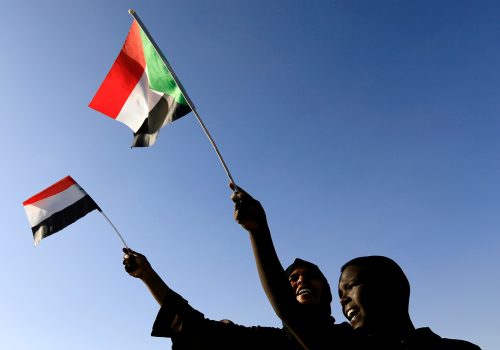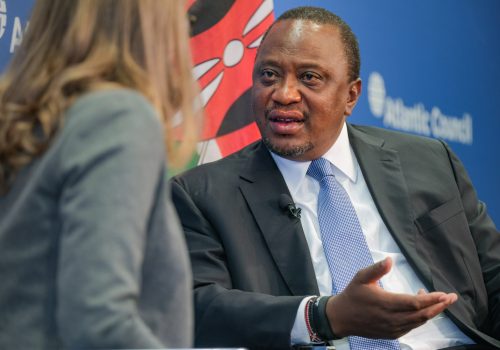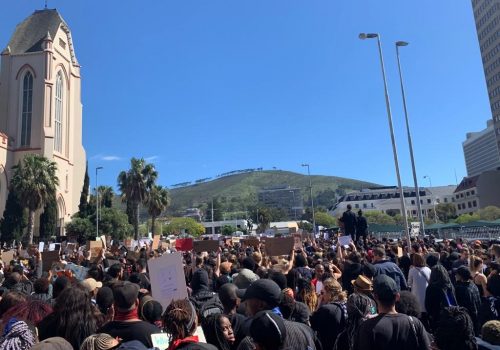The Sudan Partnership Conference: A turning point for Sudan?
The world came to Berlin yesterday (at least virtually) as part of a United Nations, European Union, and German government-sponsored “Partners Forum for Sudan.” By all accounts, it was a triumph, and potentially a turning point, for the fragile transitional civilian government of Prime Minister Abdalla Hamdok, pulling in an announced $1.8 billion in assistance to Sudan.
But the conference’s success was never going to be judged solely on financial pledges. Rather, it was the pledges of political capital that Hamdok needed to shore up his own position and keep at bay, for at least just a little longer, the still powerful and ascendant forces of Sudan’s military and Rapid Support Forces, who still wield executive authority.
That is why, after searching for months to no avail for a deep-pocketed donor to host what was originally thought to be a traditional pledging conference, Sudan and its supporters rebranded yesterday’s display of support as a Partners Forum rather than a Donors Conference. Hamdok addressed the new frame in his opening statement, noting that “the difference is not one of semantics.” As he described it, yesterday was not about a one-off pledge of support, but the start of a long-term relationship with those who share in the vision of seeing a transformed Sudan that is stable, secure, and prosperous.
It was a smart move, because yesterday’s conference was never going to be able to fully gap-fill the $1.5-2 billion hole in Sudan’s state budget or fully fund the ambitious Family Support Program that intends to lessen the pain of the country’s orthodox economic reform program by providing 80 percent of citizens a modest $5 per month stipend. Rather it was about creating enduring partnerships that Sudan needs to revitalize its economy and to put the country on a long-term development footing. According to Hamdok, those are:
- Restarting and reinvigorating productive sectors of the economy;
- Creating jobs, especially among youth where unemployment remains above 40 percent;
- Supporting human development, especially in the areas of health spending and education;
- Supporting those hurt by the economic reform program, to wit the aforementioned Family Support Program;
- Addressing Sudan’s myriad debt issues through restructuring, forgiving, and repaying; and
- Responding to the extraordinary health and economic threats posed by COVID-19.
This basket of needs made it possible for the more than forty-five countries and international institutions that participated in the Forum to find a priority to support within their respective post-COVID budget-constrained environments. That’s good, because as with other pledging conferences, yesterday’s show of financial largesse was also replete with fuzzy math and double ledger accounting.
While certainly a move in the right direction, in real dollar terms the increases in funding committed during the Forum represented only modest gains in support, and served as more of a commentary on how paltry previous assistance numbers to Sudan have been than a reflection of a seismic shift in spending. For example, fully two-thirds of participants pledged to assist in Sudan’s fight against COVID-19, though most of that pledged support will come in the form of in-kind medical support and technical assistance. Big donors, including the United States, crowed over the large total sums being provided—even though the bulk of their giving comes in the form of humanitarian assistance to conflict-affected areas and reflects only a marginal, if any, increase on the previous year’s spending. And many other countries touted three-fold, five-fold, and even ten-fold increases in development funding over past years.
Perhaps the most noteworthy initiatives were from the International Financial Institutions which included the World Banks’s $400 million pre-arrears clearance grant that could allow Sudan to tap into as much as $1.75 billion in support over the next three years, coupled with a year-long staff-monitored program from the International Monetary Fund (IMF) to help Sudan consolidate its nearly $60 billion in external debt, begin to address its $3 billion in arrears, and put it on a path toward Heavily Indebted Poor Countries (HIPC) debt relief.
The only note of discord puncturing the triumphalism of the day was the repeated calls for the United States to finally remove its State Sponsor of Terrorism designation. Fully one-third of all speakers yesterday referenced what still stands as one of the biggest brakes on new investment and an anchor weight to a past that Sudan and all those virtually assembled were trying to shed. It would seem that while Sudan still suffers from the financial and reputational effects of the designation, the terrorism albatross now rests squarely on US shoulders until it can be removed.
So while there were no surprise announcements of multi-billion dollar pledges or zeroing out of debt obligations, the prime minister and his team should take away an enormous sense of pride in the quality of their presentations and the outpouring of genuine support and friendship from so many diverse nations from around the world. Particularly powerful were the reminders from countries like Portugal, South Africa, Romania, and South Korea, who offered poignant reflections on their own transitions to democracy and development.
But what made this a true turning point is when one puts yesterday’s conference into the context of the only other international convenings on Sudan. Thirteen years ago, many of those same countries gathered to hold Sudan to account for its genocidal actions in Darfur and began looking at ways to maximize pressure on the country to relent in its campaign of terror. Subsequent to that, in September 2010, world leaders once again gathered in an extraordinary session on the sideline of the UN General Assembly meeting to heap pressure on Sudan to ensure that the soon-to-be independent South Sudan could proceed with its independence vote.
These international conferences worked in one important respect—they inflicted pain on Sudan and its citizens in ways that have outlasted the issues themselves. We must hope that yesterday’s Partners Forum has a similar lasting effect on Sudan, only this time for the good of its people, its government, and its economy.
Cameron Hudson is a senior fellow at the Atlantic Council’s Africa Center. Previously he served as the chief of staff to the special envoy for Sudan and as director for African Affairs on the National Security Council in the George W. Bush administration. Follow him on Twitter @_hudsonc.
Image: Khartoum, Sudan. (Flickr/Christopher Michel)


